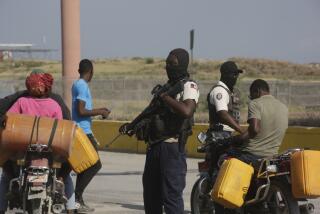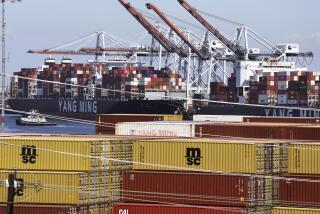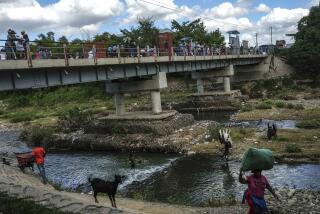Smugglers Find Loophole to Sail Through in Haiti
- Share via
JACMEL, Haiti — Five of them sit at the pier, ships of all measure, varying from 70 feet to seven times that size. Some fly the Haitian flag, one the British ensign, and some fly no flags at all. They all have one thing in common: They defy the world.
From the Leo, an anchorless rust bucket recently pulled from the beach where it had run aground, to the British-flagged Oakleigh, all have run a U.N. embargo to bring in tens of thousands of gallons of banned fuel oil--even, in at least one case, in the face of warning shots from U.S. enforcers. Pentagon officials said Tuesday in Washington that 14 ships heading for Haiti had been diverted since the embargo went into effect over the weekend. But other ships keep coming.
Jacmel, a resort created as a faux French seaside village by early 19th-Century coffee magnates, has become the center of the Haitian military’s effort to break the international sanctions ordered to force the army from power.
“The border is still a serious problem,” a diplomat said of the frontier between Haiti and the Dominican Republic, “and lots of gas comes through, but the biggest threat is now the sea.”
Under threat is the strategy by the United Nations and the United States to use a near-total embargo to end military rule and restore exiled President Jean-Bertrand Aristide, who was driven from office Sept. 20, 1991, after seven months as Haiti’s only democratically elected president.
“If we can’t stop smuggling, especially from the D. R., then the embargo is not only a failure, it is stupid,” the diplomat said.
“Ships come all the time,” said a foreign resident who has lived here for more than 20 years. “They unload barrels of gas, or they just pump it out into truck tankers, all in plain sight of the choppers.”
The choppers are U.S. naval and Coast Guard helicopters flying from the 10-ship international flotilla that is supposed to enforce the embargo, which was widened at midnight Saturday to include all goods except food and humanitarian items.
According to Jacmel residents, who have little else to do but monitor the comings and goings of the little harbor here, only one ship has been successfully turned back here, a vessel that made it into the harbor but fled when the Coast Guard radioed that it would be seized if it sailed out empty.
Another ship received the same warning but unloaded its cargo anyway. The captain, who called himself Dirty Harry, simply anchored the ship in the bay and abandoned it. He and the crew returned to the Dominican Republic overland, residents here said.
On Sunday, a 70-foot freighter called the Sea Search also ignored that warning--as well as two cannon bursts across the bow from a Coast Guard cutter--and tied up at the pier. The Pentagon officials said that another ship sailing near Haiti’s north coast was intercepted and boarded by U.S. officials Monday and was still being searched Tuesday.
The Sea Search, however, was unloading barrels of fuel Monday under the supervision of at least two Haitian army officers and in full view of reporters and other guests at a nearby hotel.
As a result of the sieve-like blockade and a U.S. policy not to use deadly force, diplomats and other experts say, Jacmel receives upward of 40% of the estimated 4 million gallons of gasoline being smuggled into Haiti.
The most notorious ship is the Oakleigh, a 500-foot tanker that lists its home port as Aberdeen, Scotland. Monitors say it comes from the Dominican Republic every other day to unload at least 50,000 gallons each time.
One day over the weekend, nine tanker trucks lined up in broad daylight in Jacmel to offload fuel to be taken to the capital, Port-au-Prince, a two-hour drive to the southwest. There it is sold on the street for about $10 a gallon.
Most of the smuggling, diplomats and Haitian business people say, is controlled by Gerard Caroli, a local businessman and close associate of Lt. Col. Michel-Joseph Francois.
Another Francois link to the smuggling is an army major known as Oiseau--French for Bird--who commands the Jacmel police and uses the force as his personal booty-gatherers.
Oiseau recently salvaged the wrecked Leo from the beach in front of one of Jacmel’s many sleazy seaside bars, got it running and joined in the parade to and from the Dominican Republic.
While far and away the most important aspect of the smuggling, fuel is not the only product unloaded here. One ship this past week brought in thousands of bicycles, another a load of televisions and stereo equipment, “all from Miami,” according to one witness.
More to Read
Sign up for Essential California
The most important California stories and recommendations in your inbox every morning.
You may occasionally receive promotional content from the Los Angeles Times.













